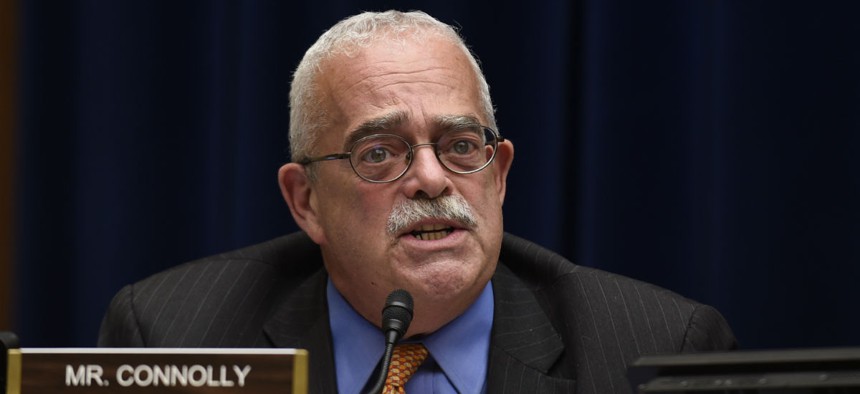House Panel Advances Bills to Streamline Firing, Reduce Employee Protections
Legislation aims to make it easier for managers to deal with poor performers; critics say provisions will undermine due process and hurt employees.
Members of the House Oversight and Government Reform Committee voted Tuesday to advance two pieces of legislation that would severely curtail the due process protections of federal employees facing discipline or dismissal.
The committee voted along party lines to send the Modern Employment Reform, Improvement and Transformation (MERIT) Act (H.R. 599) and the Merit System Protections Board Reauthorization Act (H.R. 6391) to the full House for consideration.
The MERIT Act, introduced by Rep. Barry Loudermilk, R-Ga. and amended by Rep. Paul Mitchell, R-Mich., significantly reduces the time it takes to fire a federal worker for poor performance or misconduct, giving employees only 10 days to appeal removal decisions to the Merit Systems Protection Board.
The bill also exempts adverse personnel actions and reductions in force from negotiated grievance procedures, reduces the defined benefit annuity of a federal worker who is convicted of a felony and fired, and provides agencies with the authority to rescind bonuses or other cash awards deemed to be “wrongly paid” to workers. It also extends the probationary period for new hires from one year to two.
Mitchell said the bill represents a number of common sense ways to improve the long cited problem that agencies do not sufficiently address poor performers in the federal workforce.
“This marks a holistic approach to accountability procedures,” he said. “Let’s be honest. Federal managers have to spend far too much time addressing performance issues.”
But Democrats and federal employee unions said the bill marks the latest effort to undermine the due process protections at the heart of the federal civil service system.
“Whatever the good intentions of this bill might be, there is real harm that this will inflict on federal employees,” said Rep. Gerry Connolly, D-Va. “It is in the context of an assault on federal employees in this Congress and this administration. Due process is not just a nice thing to talk about. It should be enshrined in everything we do in terms of how we approach the federal workplace. The rights of federal workers cannot be trampled upon.”
In a letter to the committee Tuesday, the American Federation of Government Employees said the bill has “no merit.”
“The provisions of H.R. 599 would allow broad congressional edict to micromanage agency personnel procedures and limit the ability of the federal workforce to seek justice when treated unfairly by management,” wrote AFGE legislative director Thomas Kahn. “The bill does not afford federal workers accused of performance or disciplinary issues adequate time to mount a credible defense and blurs the procedural line between performance-based and disciplinary actions.”
The MSPB reauthorization bill, introduced by Rep. Jody Hice, R-Ga., would reauthorize the independent agency for five years, following more than a decade of operation since its previous authorization expired in 2007. It also would allow MSPB judges to issue summary judgments, reduce the evidentiary burden for agencies to justify adverse personnel actions from “a preponderance of the evidence” to “substantial evidence,” and it would require federal workers to pay a filing fee to appeal adverse personnel actions.
That filing fee would be capped at half of what it costs to file a civil lawsuit in federal district court, which is currently $350, and Hice said the fee would be waived in whistleblower retaliation complaints.
“In fiscal 2017, MSPB received 5,406 appeals in regional and field offices for review by administrative judges,” Hice said. “Of those, 57.6 percent were dismissed without looking at the merits of the case . . . We did not wish to prevent valid appeals of agency actions that violate merit systems principles, but we want to ensure that frivolous appeals do not bog down the MSPB review process.”
But committee Ranking Member Elijah Cummings, D-Md., called the proposed changes to MSPB “a terrible approach to managing the federal civil service.”
“The effect of this bill would be to make it easier to fire federal employees and to move toward at-will employment,” Cummings said. “Some federal employees work paycheck to paycheck, and they couldn’t afford a $200 filing fee, or even $100. These dedicated men and women work day-in and day-out to serve the American people, and they would not even be able to afford to file an appeal if MSPB charged a fee.”
In a statement, National Treasury Employees Union National President Tony Reardon blasted the effort to allow MSPB to issue summary judgments.
“A core function of the board is to ensure that agencies are not doling out disproportionate discipline resulting in unequal justice,” he said. “This language would fundamentally eliminate any true appeals process in the federal sector if the MSPB could unilaterally decide not to grant an employee the opportunity for an oral hearing.”
The MSPB currently lacks a quorum, and the backlog of pending cases sits at 1,250. On Thursday, the Senate Homeland Security and Governmental Affairs Committee will hold confirmation hearings for all three of President Trump’s nominees to the board: Dennis Kirk, Julia Clark and Andrew Maunz.
Correction: The original story mistakenly portrayed the time frame for adverse personnel action appeals under the MERIT Act and described the proposed MSPB filing fee as half of the cost of filing a federal civil lawsuit. The filing fee would be capped at half the cost of filing such a suit.




